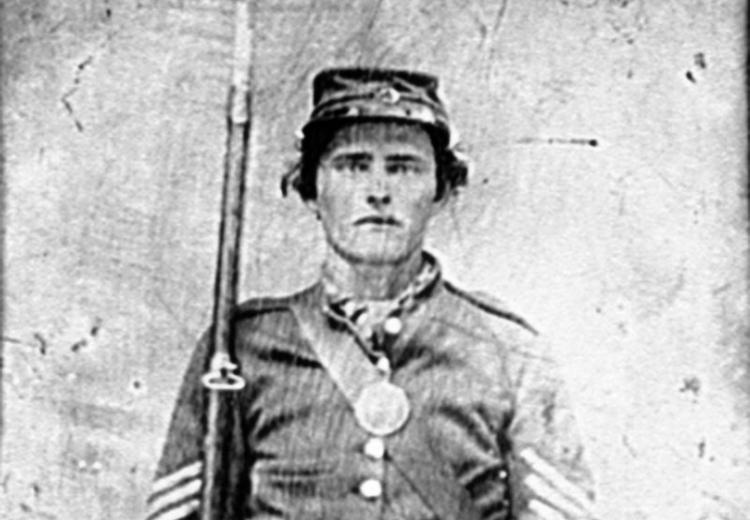The Red Badge of Courage: A New Kind of Courage

Civil War-era portrait of a Federal soldier.
"The Red Badge of Courage… is the narrative of two processes: the process by which a raw youth develops into a tried and trustworthy soldier, and the process by which a regiment that has never been under fire develops into a finished and formidable fighting machine."
—Sydney Brooks, unsigned review, Saturday Review, January 11, 1896, lxxxi, 44-5 on the Red Badge Home Page of the EDSITEment resource American Studies at the University of Virginia
"No intelligent orders are given; no intelligent movements are made. There is no evidence of drill, none of discipline. There is a constant, senseless, and profane babbling going on, such as one could hear nowhere but in a madhouse. Nowhere are seen the quiet, manly, self-respecting, and patriotic men, influenced by the highest sense of duty, who in reality fought our battles.
"It can be said most confidently that no soldier who fought in our recent War ever saw any approach to the battle scenes in this book…"The book is a vicious satire upon American soldiers and American armies. The hero of the book … betrays no trace of the reasoning being. No thrill of patriotic devotion to cause or country ever moves his breast, and not even an emotion of manly courage."
—General Alexander C. McClurg, letter to the Dial, April 16, 1896, XX, 227-8 on the Red Badge Home Page of the EDSITEment resource American Studies at the University of Virginia
In The Red Badge of Courage, Stephen Crane presents war through the eyes—and thoughts—of one soldier. The narrative's altered point of view and stylistic innovations enable a heightened sense of realism while setting the work apart from war stories written essentially as tributes or propaganda. One early reviewer declared that reading the novel "impels the feeling that the actual truth about a battle has never been guessed before." But the conservative General Alexander C. McClurg, in the magazine "The Dial," attacked the work as a "vicious satire upon American soldiers and American armies," with a central character motivated neither by "thrill of patriotic devotion to cause or country" nor "an emotion of manly courage." Though Crane is critical of abstract sloganeering about the manly virtues prized by McClurg, he is far from dismissive of or uninterested in those virtues.
McClurg regarded the novel as unpatriotic and cowardly. The novel's more nuanced exploration of such values will be explored by students with a close reading of Chapter 23 in comparison with a more traditional tale of combat and a systematic look at McClurg's accusations. Using their new understanding, students will be asked to select one of three published endings to The Red Badge of Courage best suited to their understanding of Crane's exploration of values in the novel.
Note: This lesson may be taught either as a stand-alone lesson or as a companion to the complementary EDSITEment lesson The Red Badge of Courage: A New Kind of Realism.
Guiding Questions
How does Stephen Crane treat "the process by which a raw youth develops into a tried and trustworthy soldier" in The Red Badge of Courage?
What is the novel's view of values such as courage?
Learning Objectives
Provide examples of Crane's treatment of the "manly virtues" associated with war using support from the text of The Red Badge of Courage
Describe the three published endings of The Red Badge of Courage and the difference each might make on a reader's interpretation of the novel.
